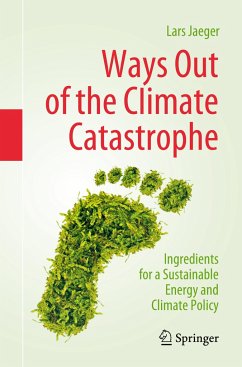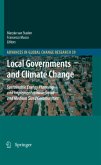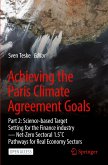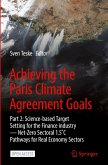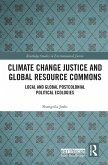Floods, species extinction, migration, droughts, super tornadoes - climate change is no longer a threat looming on the horizon but has long since become part of our everyday lives. Limiting the emerging and worsening climate changes is one of the most important challenges of our time.
All human induced climate impacts can be traced back to a single factor: Energy. This book provides a comprehensive and readable introduction to the interplay between energy and climate, which also includes the fields of technology, economics, and politics. At the same time, the issue is highly complex and can only be understood in all its details by expert scientists, meaning that the facts are often poorly presented in the political discussion about climate. To put it simply: If we want to stop and even reverse the current climate trends, we need to find answers to the following three questions:
· How exactly does our existing way of consuming energy affect the climate?
· What options are there for generating energy without negative climate effects, and what do these mean for our lives?
· What technological advances will directly help us to achieve this in future?
In a non-alarmist yet entertaining manner, the book highlights the key determinants of global energy supply. Readers will come to appreciate the crucial facts about "energy and climate", will be up to date with the latest scientific and technological knowledge, and will understand the global political and economic framework that we need to consider when designing an appropriate future energy and climate policy. At the same time, the author conveys a clear and optimistic message: We already have the technical capabilities (which will be further enhanced in the future) to reverse the devastating climate trends without significantly limiting prosperity. The obstacles lie primarily in economic and political "constraints" and particular conflicts of interest.
"A very important book that explains one of the most essential questions of our time - how we can master climate change by an energy transition - with scientific precision and clear words."
Georg Kell, founder and former Executive Director of the United Nations Global Compact
All human induced climate impacts can be traced back to a single factor: Energy. This book provides a comprehensive and readable introduction to the interplay between energy and climate, which also includes the fields of technology, economics, and politics. At the same time, the issue is highly complex and can only be understood in all its details by expert scientists, meaning that the facts are often poorly presented in the political discussion about climate. To put it simply: If we want to stop and even reverse the current climate trends, we need to find answers to the following three questions:
· How exactly does our existing way of consuming energy affect the climate?
· What options are there for generating energy without negative climate effects, and what do these mean for our lives?
· What technological advances will directly help us to achieve this in future?
In a non-alarmist yet entertaining manner, the book highlights the key determinants of global energy supply. Readers will come to appreciate the crucial facts about "energy and climate", will be up to date with the latest scientific and technological knowledge, and will understand the global political and economic framework that we need to consider when designing an appropriate future energy and climate policy. At the same time, the author conveys a clear and optimistic message: We already have the technical capabilities (which will be further enhanced in the future) to reverse the devastating climate trends without significantly limiting prosperity. The obstacles lie primarily in economic and political "constraints" and particular conflicts of interest.
"A very important book that explains one of the most essential questions of our time - how we can master climate change by an energy transition - with scientific precision and clear words."
Georg Kell, founder and former Executive Director of the United Nations Global Compact

